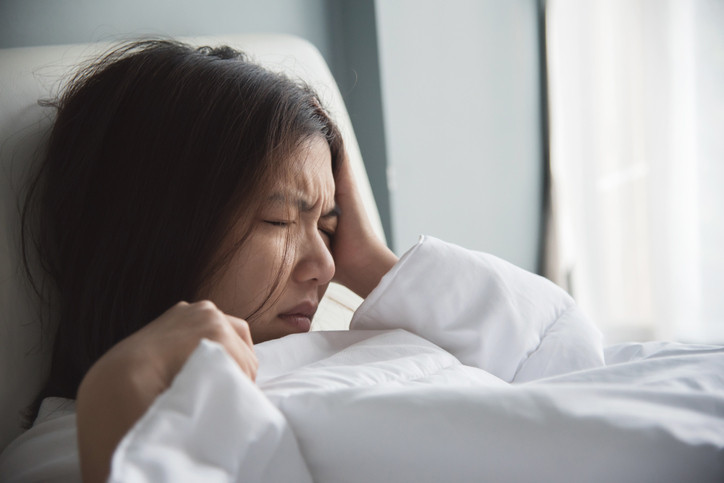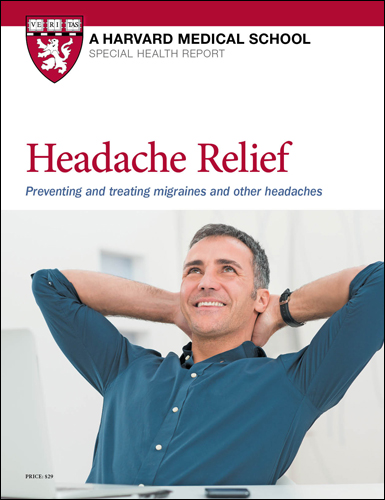Have a headache? The top 7 triggers

“Headaches aren’t welcome here” — that’s the sign you have hanging on your brain’s front door, but the pain is barging right in. You can chalk it up to stress from world events or something you ate or drank, and you might be right. But there are a number of common triggers for migraines, tension headaches, or cluster headaches. The faster you identify them, the quicker you can boot headache pain off the property.
What are the triggers for your headaches?
Take note of your circumstances when a headache starts. Keep a diary to track the day, time, symptoms, and circumstances surrounding the pain (what had you eaten? where did it happen?). Common causes of headaches include the following seven triggers.
- Stress. Stress can cause tight muscles in the shoulders and neck. This often leads to a tension headache, which starts in the neck and back and works its way up to feel like a tight band around your head. “It’s believed to start in the muscles,” says Dr. Sait Ashina, a neurologist who specializes in headache treatment at Harvard-affiliated Beth Israel Deaconess Medical Center. “When tension headaches become frequent, the pain in shoulder and neck muscles is felt by the brain as pain in the head.” Stress is also a common trigger for a migraine headache, which begins on one side of the head, throbs or pounds, makes you sensitive to light and sound, and can last for hours or days.
- Diet. Eating certain foods often triggers a migraine headache. Migraines may be started by just one type of food — like beans or nuts — or many foods, such as avocados, bananas, cheese, chocolate, citrus, herring, dairy products, and onions. “Processed foods with nitrites, nitrates, yellow food dyes, or monosodium glutamate can be especially problematic,” Dr. Ashina notes.
- Alcohol intake. Alcohol is a common cause of a migraine headache or a cluster headache — a stabbing pain in the eye that may last hours, go away, and come back several times per day. For some people, a few ounces of red wine are all it takes to provoke a headache, although any kind of alcohol can be a trigger. It’s not clear if the alcohol itself is to blame, or if another component in the drink causes the problem.
- Environment. “Cluster headaches seem to be seasonal and often happen in the spring or fall,” Dr. Ashina says. “It’s something in the environment, but we can’t tell exactly what it is yet.” Environmental factors such as bright light, smoke, humidity, intense scents, or cold weather are associated with migraine headaches.
- Hormones. Changes in estrogen levels are associated with migraines in women, and women suffer from migraines more often than men. Menstrual cycles may be tied to migraine in younger women. Varying estrogen levels during perimenopause can sometimes start migraines in women who never experienced them before. Estrogen therapy may also be a migraine trigger. Menopause does seem to end migraines in most women.
- Caffeine withdrawal. If you normally consume caffeine in coffee or tea, stopping intake abruptly may trigger a migraine. This may be because caffeine causes blood vessels to constrict; without caffeine, the blood vessels widen and bulge out with each heartbeat — a chief reason for the pounding pain of migraines.
- Lack of sleep. A lack of sleep is associated with migraines and tension headaches. “We don’t know why, but we do know there’s a correlation and that sleep can lead to pain relief. Sometimes people feel better after taking a nap,” Dr. Ashina says.
Next steps to avoid headaches or ease headache pain
If you can associate your headache pain with particular triggers, you can try to avoid them. If that doesn’t help, talk to your doctor. There are many prescription medications, as well as pill-free treatments (acupuncture, meditation, biofeedback, relaxation therapy) that can help reduce headache frequency.
And you’ll need to go a step further: “Make sure you get enough sleep, exercise, eat a healthy diet, limit alcohol intake, and reduce stress,” Dr. Ashina says. “Headaches are a condition of hypersensitivity, so you need balance in your system to fight triggers.”
Finding that balance may be difficult right now, with the world in turmoil. But maintaining good health, and keeping a clear head that’s free of pain, will certainly give your more focus, and maybe even more strength to get through this challenging time.
About the Author

Heidi Godman, Executive Editor, Harvard Health Letter
Disclaimer:
As a service to our readers, Harvard Health Publishing provides access to our library of archived content. Please note the date of last review or update on all articles.
No content on this site, regardless of date, should ever be used as a substitute for direct medical advice from your doctor or other qualified clinician.
















